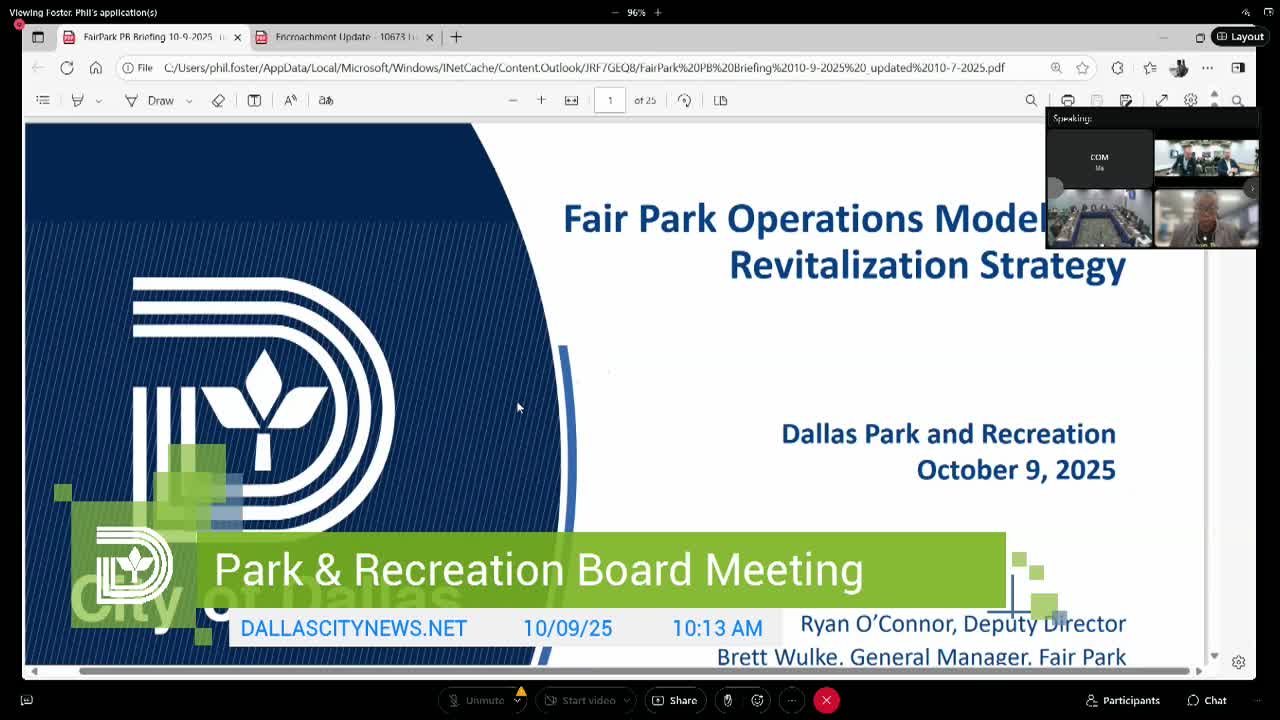Dallas parks staff propose hybrid Fair Park plan focused on revenue, short-term contracts and community input
Get AI-powered insights, summaries, and transcripts
Subscribe
Summary
Park department leaders presented a high-level, five-pillar strategy to revive Fair Park that keeps city control of campus operations, contracts with private event experts and seeks an economic-development study; board members asked for detailed financial analysis and stronger community engagement.
Dallas Parks and Recreation staff outlined a high-level plan to revitalize Fair Park during a board briefing, proposing a hybrid operations model that retains city control while contracting short-term services to private experts, pursuing economic development on campus and creating nonprofit partners to raise philanthropy.
The plan, presented to the Parks and Recreation Board, lays out five pillars — maximizing campus partners, developing recurring community programming, attracting large campus activations, pursuing retail/hospitality economic development, and creating nonprofit foundations — and calls for near-term one- to two-year contracts followed by longer three- to five-year procurements.
Why it matters: Fair Park draws more than 4,000,000 visitors a year, department leaders said, and the campus includes historic buildings and large venues such as the Cotton Bowl and Coliseum. For the city to maintain those assets and reduce deferred maintenance, staff say Fair Park must generate new, sustainable revenues while involving neighboring communities.
Staff described a three-leg model: keep the city responsible for overall campus operations and grounds/facility maintenance; hire private firms for sales, booking, marketing, food and beverage, parking and security; and cultivate nonprofit partners to leverage private philanthropy and third-party funding. Bridal Wilkie, identified in the briefing as Fair Park general manager, said staff are pursuing short-term agreements now to “operate the park successfully” and will move to longer procurements once those interim contracts are in place.
Board members pressed for numbers. Scott Goldstein, identified earlier in the meeting as chair of the board’s administration and finance committee, said the presentation was a strong start but that the board needs an economic analysis and an updated pro forma before it can weigh in on high-level strategy. “It’s hard for us to make informed decisions without seeing some numbers and some math on paper,” Goldstein said.
Vice Chair Connor asked about staffing and implementation timelines after staff compared Fair Park to the Rose Bowl model; staff said Fair Park’s plan intentionally differs by contracting event execution to private operators rather than recreating a stadium-focused operating company. Connor also flagged safety and neighborhood perceptions as critical to success; staff said they will coordinate with the Dallas Police Department and other city agencies on a comprehensive plan for ingress, egress and neighborhood streetscape improvements.
Public commenter Ken Smith, president of Revitalize South Dallas Coalition, urged transparency and inclusion in the Fair Park process, telling the board: “Restore trust in the process.” He asked that the department name accountable parties from the prior privatization effort, apologize to South Dallas residents and give neighborhood residents a seat at the table. Smith also asked the department to pursue film-production opportunities and to add safe crosswalks to improve pedestrian access.
Staff identified several near-term actions: secure short-term (one- to two-year) contracts for security, parking and food-and-beverage services; finalize an event-attendance surcharge implementation; initiate an economic-development study in partnership with the Dallas Economic Development Corporation and local chambers; and evaluate existing tenant contracts across campus. Staff said they expect to “embark upon” the development study process within roughly 90 to 180 days and to report back to the board with progress updates.
Board members repeatedly emphasized community engagement and local economic benefit. A member noted the neighborhood’s large Hispanic population and asked that outreach include representatives from those communities. Multiple board members recommended a regular cadence of briefings so the board can “grade ourselves” on milestones as short-term contracts are implemented.
No formal board vote or binding decision about governance changes was recorded in the briefing. Staff repeatedly characterized the presentation as a “vision” and high-level roadmap; they said formal changes to governance or long-term contracts would follow procurement processes and likely take 18 months to two years to finalize.
Next steps: staff will continue securing short-term agreements, begin the economic-development study with partner organizations and return to the board with financial analysis, procurement timelines and community-engagement plans.
